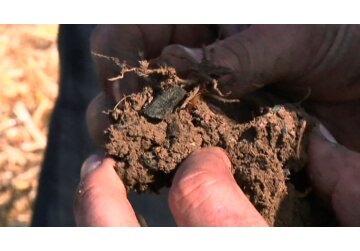
The 'black gold' that could help fight climate change for centuries to come
One farmer told Sky News the technique almost seemed too good to be true, but there's real hope it could help the UK reach net zero.
A high-grade version of BBQ charcoal is being tested as a way of removing greenhouse gas from the atmosphere for centuries to come.
The charred wood, called biochar, has been spread over farmland in one of the first large-scale trials of its kind, in the hope carbon captured by trees from the air during their lifetime can be buried in the soil.
Trial lead Tom Bott, from the University of Nottingham, told Sky News the technique could help the country reach net zero.
"As a tree grows, it captures carbon from the atmosphere and converts it into wood," he said.
"Then if we add it (biochar) to the land, we potentially get some benefits to our crops, and we're also sequestering carbon that's important for helping to combat climate change."
If wood rots or burns, it releases carbon back to the atmosphere.
But by heating it to temperatures as high as 600C in an oven purged of oxygen, the carbon undergoes a chemical change that locks it up as biochar - often referred to as "black gold".
'We have to show we're willing to change'
Farmer Olly Carrick spread 10 tonnes of biochar on a test field at the Allerton Project research site in Leicestershire last summer.
He has since sown winter wheat, but it is too soon to tell whether there has been an effect on plant growth.
He said biochar could be a way of offsetting any unavoidable carbon emissions from farming.
"It did sound too good to be true," he said.
"But we're open-minded.
"If we can store more carbon in the soil and not affect crops, then that's a bonus.
"We've got to take that opportunity to show we are willing to change, certainly as an industry and as a business."
An innovate but secret technique
But biochar only contains a third of the material originally in the "raw" wood.
A team from Aston University in Birmingham is looking at ways of using the carbon in the other two thirds, which normally goes to waste and leaks back to the atmosphere.
Tim Miller, director of the university's Energy and Bioproducts Research Institute, has an innovative, but secret, technique for capturing gases and liquids given off during the biochar manufacturing process.
That includes an oil that could be used in heating boilers and ship engines, or form a key ingredient in bioplastics.
A vinegar can also be syphoned off to be used as a weed killer and plant stimulant.
"We're trying to catch everything which is in the wood," he said.
"We want to make the maximum use of it, so we get the best use of the carbon and also the best use of the products commercially.
"The whole process needs to be commercially sustainable, so it can also be scaled."
news.sky.com







